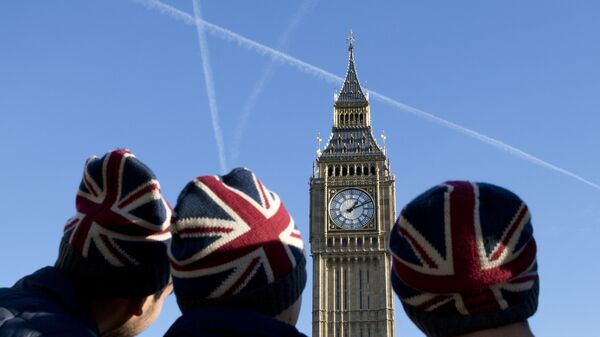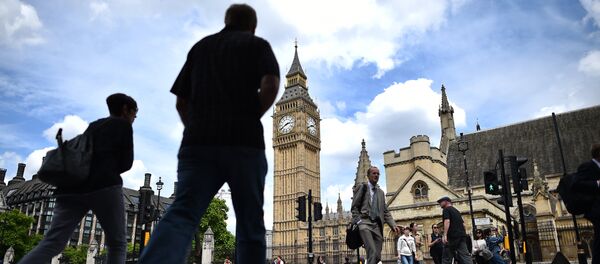In 2016, mainstream media headlines were dominated by an incident in West London, where racist graffiti was found on the entrance to a Polish cultural center in Hammersmith. However, it soon became apparent that post-Brexit, anti-immigrant images were also popping up in other areas of London and it wasn't pretty.
Experts say that the country should prepare for the possibility of further spikes in offenses once the Brexit process has begun.
Let's crack down on hate crime in the UK together! https://t.co/0iQHI0q7og pic.twitter.com/93K3vxslSR
— New Europeans (@NewEuropeans) 16 February 2017
The PA figures provide the first complete picture of hate crime recorded by police in England and Wales, following the June 23 referendum. They show that in the three months ending September 2016, 33 out of 44 police forces recorded the highest quarterly number of hate crimes since April 2012
Three forces each recorded more than 1,000 hate crimes; this was the Metropolitan Police (3,356), Greater Manchester (1,033) and West Yorkshire (1,013). Only four forces reported a decrease in the previous three months.
Mike Ainsworth, director of London services for Stop Hate UK, a leading national organization working to challenge all forms of hate crime and discrimination, believes that there were specific parts of the EU referendum campaign which led to this spike in hate crime cases being seen in the UK.
Mr. Ainsworth, believes that commentary made by the Leave camp may have contributed to the rise in racism.
For example, the former UK Independent Party (UKIP) leader Nigel Farage, who campaigned for Britain to leave the EU, also presented a controversial launch poster during the campaign, depicting hundreds of non-white immigrants under the title "Breaking Point."
FARAGE: UKIP poster featuring a line of refugees with the words 'Breaking Point' caused widespread anger pic.twitter.com/l44GnrfftU
— backdoordraft (@backdoordrafts) August 25, 2016
"It's difficult to give definitive reasons, however in our view it's been the way the campaign was done. It appeared to give legitimacy to racist hate crime and it's disappointing the way that the Leave campaign conducted itself. There is no reason to say the vote to leave the EU should lead to hate crime, but the the campaign was handled badly.
"The focus on immigration and otherness, the UKIP posters in particular, gave legitimacy to racist views and that is unfortunate. Those people need to take responsibility for that," Mr. Ainsworth told Sputnik.
These comments were echoed by politician Ruth Davidson, Member of the Scottish Parliament (MSP), who told Sputnik that the tone of the debate ahead of the referendum on the United Kingdom's membership in the European Union was "bordering on being xenophobic."
There are some human rights organizations, according to the Press Association, that believe once Britain finally leaves the EU, the level of racism and hate will only get worse.
Anti-#Semitic hate #Crime at #Record high, says UK #Charity https://t.co/alXGOuDuwp pic.twitter.com/h91LHzrLEU
— NewsVideos (@newsinvideos) 2 February 2017
This is not a view shared by Mr. Ainsworth, who believes that progress has been made and that the UK will overcome this latest set-back.
"We have come a long way since 2012 in dealing with hate crime and the UK was leading. I think that reputation was severely tarnished by Brexit.
"When you look at the police and support mechanisms in place, we can recover. There is also a need to report it in order to tackle it. There was an increase seen after Brexit, but there is a wiliness to overcome and progress in order to get better," Mr. Ainsworth told Sputnik.
Mr. Ainsworth also believes thatstrong moral leadership is needed and that the media also needs to take responsibility for the stories it publishes and the narrative it portrays.
"I think there is no reason to believe that things will get worse when we leave the EU. We need strong moral leadership and we saw bits of that after the vote, when the former UK Prime Minister David Cameron was clear in his condemnation of hate crime and this needs to be followed suit by other senior figures," he added.
With the UK facing the challenge of now attempting to re-establish itself as a country of acceptance, Mr. Ainsworth believes that Britain has the ability to look forward to something which is far better, making reference to the Hate Crime Action Plan, which was published shortly after Brexit.
"We have seen good examples in the UK of how to tackle racism, that is the way forward. We need to make sure that people know that hate crime is not to be normalized and also that people who commit hate crimes are brought to justice," Mr. Ainsworth concluded.




